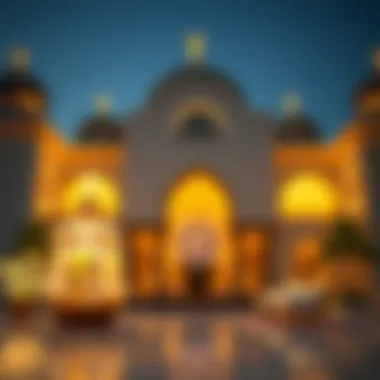Holiday Calendar 2024 UAE: Key Insights and Impact


Intro
Understanding the dynamics of the holiday calendar in the United Arab Emirates for 2024 is essential for anyone looking to establish a foothold in this bustling market. The UAE is not just a melting pot of cultures but also a land of opportunities, particularly in the realms of real estate and business. The unique blend of national holidays and cultural festivities can significantly impact various aspects of daily life, economic activities, and strategic investments.
In the UAE, holidays are steeped in tradition, often showcasing the rich heritage and diverse community that thrives within its borders. From Eid celebrations marking the end of Ramadan to National Day festivities, each holiday brings its own flavor and significance. For business owners, understanding these dates is crucial, as they can create both opportunities and challenges. Investors and residents alike need to navigate these implications carefully to harness the full potential of their endeavors.
This article will dissect the 2024 holiday calendar with a keen eye on how these festivities intertwine with market trends, real estate prices, and lifestyle choices. By shedding light on the correlation between holidays and market behaviors, we aim to paint a comprehensive picture that helps both foreign and local investors make informed decisions. As we progress, we'll delve into market trends, real estate buying and renting guides, and the nuances that come with holidays in the UAE.
Intro to the UAE Holiday Calendar
The UAE holiday calendar is not just a list of dates; it represents a rich tapestry of cultural identity, religious observance, and national pride. Understanding this calendar is essential for anyone looking to navigate life in the UAE, from residents to investors, enabling a deeper appreciation of the country’s unique ethos and social dynamics.
Importance of Holidays in UAE
Holidays in the UAE serve multiple significant functions. They offer opportunities for the community to bond over collective traditions, encourage participation in religious practices, and contribute to the nation’s narrative. Each holiday brings with it a set of customs and rituals that foster a sense of belonging and continuity. For instance, during Eid al-Fitr and Eid al-Adha, families gather to celebrate, share meals, and participate in charitable acts, reinforcing social ties.
Moreover, the national holidays represent key moments for national pride, reminding citizens of the milestones that have shaped the UAE’s history. The celebration of the UAE National Day on December 2nd, for instance, commemorates the unity of seven emirates, promoting a sense of solidarity among residents, both local and expatriate. This not only enhances community spirit but also attracts tourists and investors keen on experiencing the vibrant culture.
Overview of Celebrations and Observances
In 2024, the UAE's holiday calendar will be a reflection of its multifaceted culture, featuring a blend of traditional Islamic holidays and modern cultural events. The notable religious celebrations, such as Eid al-Fitr marking the end of Ramadan, and Eid al-Adha commemorating the willingness of Ibrahim (Abraham) to sacrifice his son as an act of obedience to God, are days of festivity and cultural observance.
Apart from religious holidays, there are numerous other celebrations throughout the year that highlight the UAE's dynamism. Events like the Dubai Shopping Festival, which not only promote shopping but also showcase art and culture, attract millions to the emirate. The Abu Dhabi Film Festival provides a platform for artists and filmmakers to present their work, fostering creativity and enhancing cultural dialogue.
These holidays are often moments where businesses see increased activity, presenting opportunities for investors and buyers to engage with the market. Understanding the nuances of these observances is crucial for strategizing in real estate, hospitality, and retail sectors, making the holiday calendar an indispensable tool for successful navigation in the UAE's vibrant economy.
"The UAE’s holiday calendar is a mirror reflecting the nation’s values, aspirations, and communal bonds, essential for both personal and professional interactions."
National Holidays in the UAE
National holidays in the UAE hold great significance, reflecting the cultural richness and collective identity of the different emirates. They provide a moment for citizens and residents to come together, celebrate their heritage, and recognize the achievements of the nation. For investors, understanding these holidays is crucial as they can significantly affect business operations and market dynamics.
Holidays in the UAE are not just marked by days off work; they are packed with traditions, societal values, and a spirit of community. They present opportunities for businesses to engage with consumers in unique ways, influencing spending habits and customer behavior. Moreover, the fluctuation of demand in various sectors surrounding these holidays can affect real estate markets, as temporary increases in tourism can lead to short-term rental opportunities.
To grasp the implications fully, it's essential to familiarize oneself with the specific holidays.
Public Holidays: A Complete List
The UAE's public holidays are generally predictable, but knowing precise dates is vital for planning activities or investments. The list includes:
- New Year’s Day (January 1)
- Eid al-Fitr (dates vary based on lunar calendar)
- Arafat Day (the day before Eid al-Adha, dates vary)
- Eid al-Adha (dates vary)
- Islamic New Year (dates vary)
- Prophet Muhammad's Birthday (dates vary)
- UAE National Day (December 2)
- Commemoration Day (November 30)
These dates are subject to change based on the lunar calendar, especially for religious holidays. They offer those involved in the real estate sector potential windows for promotions, open houses, and community events.
Significance of Each National Holiday


- New Year’s Day
Marks the beginning of a new calendar year; it’s often celebrated with fireworks and social gatherings. - Eid al-Fitr
Celebrated at the end of Ramadan, a month of fasting. This holiday is marked by prayers, feasting, and social festivity. - Arafat Day
Important for Muslim observance as it signifies the culmination of Hajj pilgrimage. Generally involves reflection and prayer. - Eid al-Adha
This involves the act of sacrifice, commemorating Abraham’s willingness to give his son. It promotes values of charity and generosity. - Islamic New Year
The first day of Muharram. While it is not celebrated as jubilantly, it marks a time of reflection and planning. - Prophet Muhammad's Birthday
An opportunity for Muslims to reflect on his teachings and life. Events are held in his honor. - UAE National Day
A celebration of the founding of the federation in 1971. People participate in parades, cultural events, and gatherings. - Commemoration Day
Honors the sacrifices of the UAE's martyrs. It is a solemn day of remembrance and reflection, promoting patriotism.
Understanding the significance of these holidays illuminates not just the traditional practices but also how they can affect consumer behavior and economic trends, impacting residential and commercial real estate opportunities throughout the UAE.
"In the UAE, every flag and festival tells a story, one that underscores the coexistence of tradition and modernity, reflecting the heart of its people."
Familiarity with these holidays can enhance the profile of any investment strategy or property management plan as it informs scheduling, marketing, and operational decisions.
Religious Holidays: Key Dates and Customs
Religious holidays play a pivotal role in shaping the cultural fabric of the UAE. They provide a glimpse into the traditions cherished by the local populace while fostering inclusivity and understanding among various communities within the Emirates. As the nation thrives on a mix of cultures from around the globe, these holidays serve not only as a time for celebration but also as an opportunity for individuals, particularly expatriates, to engage more deeply with local customs. Understanding these key dates and their customs provides numerous advantages, such as enhancing social interactions and creating stronger community bonds.
Eid al-Fitr: Celebration and Timing
Eid al-Fitr marks the end of Ramadan and is celebrated with great zeal. Typically falling in the lunar month of Shawwal, the exact date is determined by moon sightings, often leading to variations in timing across different regions. In 2024, Eid al-Fitr is expected to be celebrated on April 11th, though residents should confirm with local authorities to account for lunar phases.
During this celebration, it’s customary to observe Salat al-Eid, a special prayer held every morning, gathering individuals in large congregations, often at mosques or open spaces. This is followed by a festive breakfast enjoyed with family and friends, where it’s traditional to share a dish called Khareef—a type of sweet casserole made especially for the occasion. On this day, many individuals also engage in charitable acts, distributing Zakat al-Fitr, which helps those less fortunate join in the festivities.
The spirit of community and generosity permeates this holiday, illustrating the core Islamic values of compassion and unity.
Eid al-Adha: Practices and Observances
Eid al-Adha, known as the Festival of Sacrifice, is another of the most significant religious holidays in the UAE. Scheduled for June 16th in 2024, it coincides with the end of Hajj, the Islamic pilgrimage to Mecca. This festival commemorates the willingness of Prophet Ibrahim to sacrifice his son as an act of obedience to God.
Eid al-Adha celebrations include the Qurbani, a ritual sacrifice of animals such as sheep, goats, or cows, emphasizing the themes of sacrifice and sharing. The meat from the sacrifice is typically divided into three parts: one-third for the family, one-third for friends and neighbors, and the remaining one-third for those in need. This practice reinforces communal ties and promotes charity.
The rituals involve gathering for special prayers, along with festivities that can include sharing meals, exchanging gifts, and visiting family members. It’s also a common practice for expatriates to partake in these festivities, helping bridge cultural gaps and fostering greater appreciation among diverse communities.
Islamic New Year and Its Impact
The Islamic New Year, known as Hijri New Year, is marked on the first day of Muharram, which begins a new year according to the Islamic calendar. In 2024, this will be on July 7th. While it is not as widely celebrated as Eid, it holds significance as a time for reflection and spiritual renewal.
Observations might include reciting prayers, contemplating personal growth in the past year, and making plans for the future. Although not a public holiday like Eid, its observance impacts the retail and hospitality sectors, as many residents choose to reflect on their goals and aspirations, often leading to increased activity in these areas.
It is essential for investors and business entities to be aware of these observances, as they impact market engagement and consumer behavior. This understanding can help navigate the sometimes nuanced responses of expatriates and locals alike to these culturally significant events.
"Understanding local holidays is key for thriving in this diverse market.” - Local Real Estate Analyst
For further insights on these celebrations and their broader implications, consider visiting sources such as Britannica and UAE Government.
Cultural Events and Festivals in
Cultural events and festivals in the UAE are not just sources of entertainment; they embody the spirit, heritage, and diversity of the nation. As 2024 approaches, understanding these events offers investors, expatriates, and residents vital insights into the socio-economic landscape of the region. Celebrations foster community bonds, attract tourists, and can significantly influence the local economy. They also serve as a platform for cultural exchange, showcasing the rich tapestry of traditions within the UAE.
Dubai Shopping Festival: Details and Dates
The Dubai Shopping Festival is a flagship event, held annually, that makes the city hum with excitement. Scheduled to run from January 10 to February 10, 2024, this festival turns the spotlight on the retail scene, peppering it with significant discounts, entertainment, and numerous events designed to entice shoppers from all walks of life.


The festival is not merely a shopping bonanza; it features fireworks, parades, and concerts, each contributing to an atmosphere that goes beyond consumerism. For businesses, this is a prime opportunity to enhance visibility, attract tourists, and, importantly, stimulate sales in a buyer’s paradise. Local markets thrive during this period, which boosts the real estate market as retail spaces often see increased foot traffic.
Abu Dhabi Film Festival: What to Expect
The Abu Dhabi Film Festival, typically held in October, is a notable occasion on the film calendar. In 2024, expect an enticing mix of local talent and international cinematic creations. This festival showcases films that challenge norms and celebrate storytelling from diverse backgrounds.
Expect panels with filmmakers, Q&A sessions, and an overall vibe of collaboration and inspiration. Such events attract not only film enthusiasts but also investors in the creative sector. The ripple effect on local businesses, hotels, and restaurants contributes to a vibrant economy during the festival. For those seeking to deepen their understanding of filmmaking, this event serves as a melting pot of ideas and creativity.
Local Heritage Festivals: Celebrating Diversity
The UAE's local heritage festivals are digital manifestations of its history, showcasing customs and traditions. These festivals occur at various times throughout the year, such as the Al Ain Cultural Festival or the Sharjah Heritage Days. Each festival provides a unique avenue to explore the different emirates’ artistic expressions and historical significance.
The programs often include traditional music, dance performances, poetry readings, and agricultural celebrations that pay homage to the UAE’s Bedouin roots. For expatriates, participating in these festivals is an excellent way to immerse themselves in local culture and foster meaningful connections. From an economic standpoint, these events ignite interest in the local artistry, which can have long-term benefits for cultural tourism and local crafts.
Festivals in the UAE are not just events; they are gateways to understanding the country's diverse cultural landscape, which can inspire unique investment opportunities.
Seasonal Trends in Real Estate During Holidays
Navigating the dynamic landscape of real estate in the UAE during holiday periods holds profound significance for investors and residents. The influx of both local and international visitors, coupled with the country's unique cultural observances, creates a distinctive atmosphere that directly influences market activity and demand for properties. Understanding the seasonal trends during these holidays offers essential insights for stakeholders aiming to make informed decisions in the vibrant property market.
Impact of Holidays on Market Activity
The holiday season typically generates a surge in market activity, which can be traced back to various factors:
- Tourism Boost: Major holidays, such as Eid al-Fitr and the Dubai Shopping Festival, often see an uptick in tourism, which can lead to increased interest in both residential and commercial properties.
- Investor Sentiment: Many investors perceive holidays as a prime time to buy or sell properties, hoping to capitalize on the seasonal enthusiasm. As families look to move or secure vacation homes, this period can generate higher-than-normal transaction volumes.
- Promotional Opportunities: Real estate developers and agents often ramp up marketing efforts during holidays, launching exclusive deals or open house events to attract potential buyers and renters. Such initiatives can lead to faster property turnover and stiffer competition for desirable listings.
The cyclical nature of holiday impacts means that savvy investors keep a close eye on market trends to strategize effectively. For instance, understanding when locals are most likely to engage in property transactions can provide a competitive edge.
Holiday Seasons and Rental Demand
The demand for rentals also sees notable fluctuations during holidays. For expatriates and newcomers to the UAE, holidays may represent an ideal time to relocate or seek short-term housing. Here are some key considerations:
- Increased Short-Term Rentals: Properties in locations popular with tourists often experience heightened demand for short-term rentals, particularly during peak seasons when visitors flock to the UAE. Sites like Airbnb and Vrbo can become bustling hubs for this very reason, ensuring landlords have a lucrative opportunity to monetize their properties.
- Long-Term Rental Trends: Families often prefer to sign rental agreements during holidays when they have time to settle in and acclimate to a new culture. This can lead to an upturn in long-term rental applications, as expatriates look for stable housing options after the initial influx of tourists begins to dwindle.
- Pricing Dynamics: The increased demand can result in rising rental prices in sought-after areas, particularly during holiday seasons. Understanding these trends can help landlords adjust their pricing strategies accordingly to remain competitive in the marketplace.
"Anticipating the seasonal shifts in the real estate market can often be the difference between a successful investment and a missed opportunity."
Overall, grasping the significance of seasonal trends can empower investors, real estate agents, and potential homeowners with the knowledge to make strategic decisions. By leveraging these insights, stakeholders can better navigate the intricacies of the UAE property market during festive times.
Considerations for Expatriates
As the UAE continues to attract a melting pot of talent and investment, it is crucial for expatriates to grasp the intricacies of the holiday calendar. Understanding these festivities can significantly enhance both personal and professional experiences in this dynamic region. Whether new to the country or simply navigating the intricacies of a different culture, appreciating the local holiday customs can lead to a more integrated lifestyle and better interactions within the community.
Navigating Holidays as New Residents
For expatriates, holidays hold a particular significance. Celebrating alongside local traditions fosters a sense of belonging. New residents should make an effort to learn about both national and religious holidays. Dates like Eid al-Fitr and Eid al-Adha, for instance, carry a weight of importance, marked by family gatherings and community events. While most establishments accommodate holiday schedules, it's wise for expatriates to plan ahead, especially if seeking services or amenities during these times. Different areas may celebrate in their own unique ways.


- Get familiar with the calendar: Knowing when holidays occur allows expatriates to avoid potential disruptions in daily life.
- Join community events: Many neighborhoods host public celebrations, providing an excellent avenue to mingle with locals and other expatriates alike.
- Respect local customs: Being aware of how to appropriately engage in these festivities helps to honor the rich local culture, enhancing interactions.
Being proactive in understanding holidays can turn potentially challenging situations into engaging experiences that deepen ties to one’s new home.
Cultural Sensitivities and Observances
Cultural awareness is of the utmost importance for expatriates in the UAE. With a diverse population, the holidays observed can vary widely among different groups. Expatriates need to be mindful of the cultural sensitivities surrounding these days of observance. For instance, during Ramadan, non-Muslims are generally advised to refrain from eating and drinking in public spaces until sunset.
Furthermore, showing respect towards the rituals and practices observed during significant holidays can greatly foster goodwill. Expatriates can benefit by adhering to these social nuances:
- Dress appropriately: During religious festivals, especially in places of worship, adhering to modest dress codes is necessary. It shows respect for local customs.
- Understand local greetings: Simple gestures, like wishing someone a “Happy Eid,” can go a long way in bridging cultural divides.
- Be aware of public behavior: Each holiday has its own set of behavioral expectations. Understanding and following these can mitigate any potential faux pas.
Ultimately, embracing and respecting cultural sensitivities is essential not just for personal growth, but also for building relationships and networks within the community. This approach is key to not just existing, but thriving in the vibrant tapestry that makes up the UAE.
"Cultural sensitivity is not about being politically correct. It's about understanding and appreciating the differences that enrich our experiences."
With thoughtful consideration of local customs, expatriates can navigate the holiday landscape in the UAE with confidence. For further understanding on cultural practices, resources like Wikipedia and Britannica provide comprehensive insights.
Finale
The conclusion serves as a pivotal segment in this article, tying together the significant elements surrounding the holiday calendar of the UAE for 2024. Its importance lies in summarizing the distinct holidays and cultural observances, providing clarity and context for residents, expatriates, and potential investors alike. By reflecting on the highlights of each holiday, we can appreciate their relevance not just as days off, but as critical periods for understanding social dynamics in the UAE.
In this year’s journey through the holiday landscape, we see a unique blend of tradition and modernity, offering citizens and foreign professionals a chance to partake in vibrant celebrations, enhancing cultural cohesion. Observing such holidays as Eid al-Fitr and Eid al-Adha transcends mere festivity; it involves understanding local customs and showing respect for deeply rooted practices that influence everyday life.
Moreover, the section illustrates how these holidays impact real estate activities in urban areas like Dubai and Abu Dhabi. Investors and buyers can decipher market patterns, optimizing their strategies based on seasonal demand spikes that typically occur during festive periods. The synthesis of cultural events and their timing provides essential insights for those looking to make informed decisions in the UAE market.
The benefits of grasping the UAE holiday calendar go beyond just personal observation; it feeds into a larger framework of market understanding and cultural appreciation. For newcomers and seasoned residents alike, being attuned to these observances fosters community interaction, paving the way for more profound engagement within the socio-economic fabric of the UAE.
Recap of Holiday Significance
As we reflect on the holiday calendar for 2024, we see that it is not just a collection of dates. Each holiday resonates with meaning, shaping social structures and affecting daily routines. The public holidays enable a communal pause, allowing families to gather, celebrate, and reminisce, strengthening social bonds essential in such a diverse environment.
One significant factor in the 2024 UAE holiday context is how religious observances impact various sectors. For instance, Eid events generally lead to increased retail activity, prompting businesses to prepare for heightened consumer interest.
Furthermore, each holiday has its distinct rituals and traditions—ranging from communal prayers during Eid to fireworks on UAE National Day—which contribute to an understanding of UAE identity. Being aware of these elements helps expatriates and investors alike to engage more thoughtfully within this multifaceted culture.
Looking Ahead: Future Trends
Looking ahead, the future trends surrounding the holiday calendar in the UAE suggest a growing integration of cultural practices with technology and sustainability initiatives. As the nation prepares for its place on the global stage, events may evolve to include hybrid experiences, allowing for both physical and virtual participation. We can expect innovations in how holidays are celebrated, enhancing accessibility for everyone.
There’s also the probable rise in sustainable practices during festivities. The UAE government is already emphasizing environmental responsibility, which could reshape how events are organized, from waste management during holidays to promoting eco-friendly products during peak shopping seasons.
Investors and citizens should prepare for these shifts that not only reflect a commitment to tradition but also align with contemporary global movements. Staying informed on these matters will be crucial as the UAE navigates its growth while celebrating its rich heritage.
Engaging with the community and embracing these changes will undoubtedly enhance residents' experiences, positioning the UAE as a leading light in cultural celebration and socio-economic collaboration. As the year unfolds, it remains essential for everyone involved in the UAE landscape to keep an eye on the intertwining paths of holiday customs and emerging trends.
Sources for Further Reading
Acquainting oneself with the holidays in the UAE is not merely about knowing the dates; it’s also about grasping the cultural, social, and economic implications that come with them. Here are some noteworthy resources:
- UAE Government Portal: The official government site provides essential updates regarding public holidays and observances. This helps keep residents and investors well-informed about legal requirements and government announcements regarding holiday scheduling.Visit UAE Government Portal
- Britannica: For those interested in the historical context behind the celebrations, Britannica offers well-researched articles that delve into the significance of each holiday, including Eid al-Fitr and Eid al-Adha.Visit Britannica
- Cultural Atlas: This platform provides insight into the varied cultural practices and customs observed in the UAE during holidays, offering perspective on how traditions shape local life.Visit Cultural Atlas
- Reddit - r/uae: A community-driven space where both locals and expatriates share experiences, advice, and information related to holidays, festivals, and their impacts on daily life. Engaging in discussions here can provide real-time insights.Visit Reddit
- The National: An English-language newspaper based in Abu Dhabi that covers news on UAE holidays as well as cultural events, providing various levels of coverage from local to international perspectives.Visit The National
Each of these resources contributes a unique perspective and depth to the understanding of the UAE's holiday calendar, equipping readers with were to turn for accurate information. Whether you’re a resident, an investor, or simply curious about the local customs, these links can serve as valuable tools to navigate the holiday landscape efficiently.















